-
 Bitcoin
Bitcoin $117,991.5647
-0.03% -
 Ethereum
Ethereum $2,966.4808
0.18% -
 XRP
XRP $2.8076
0.64% -
 Tether USDt
Tether USDt $1.0003
0.00% -
 BNB
BNB $689.9050
-0.63% -
 Solana
Solana $162.0407
-0.80% -
 USDC
USDC $0.9999
0.00% -
 Dogecoin
Dogecoin $0.1995
-1.51% -
 TRON
TRON $0.3001
-1.21% -
 Cardano
Cardano $0.7426
3.25% -
 Hyperliquid
Hyperliquid $47.7978
2.84% -
 Stellar
Stellar $0.4411
16.52% -
 Sui
Sui $3.4267
0.15% -
 Chainlink
Chainlink $15.3148
0.07% -
 Bitcoin Cash
Bitcoin Cash $506.5880
-1.91% -
 Hedera
Hedera $0.2222
12.41% -
 Avalanche
Avalanche $21.2049
1.67% -
 UNUS SED LEO
UNUS SED LEO $9.0606
-0.19% -
 Shiba Inu
Shiba Inu $0.0...01325
-0.86% -
 Toncoin
Toncoin $2.9979
0.32% -
 Litecoin
Litecoin $94.3717
1.13% -
 Polkadot
Polkadot $3.9873
-0.29% -
 Monero
Monero $336.1497
0.92% -
 Dai
Dai $0.9999
-0.01% -
 Uniswap
Uniswap $8.5189
-0.60% -
 Ethena USDe
Ethena USDe $1.0005
-0.04% -
 Pepe
Pepe $0.0...01236
-0.92% -
 Bitget Token
Bitget Token $4.4002
-0.23% -
 Aave
Aave $303.5433
1.05% -
 Bittensor
Bittensor $391.1314
-0.35%
Is Bitcoin mining centralized?
Bitcoin mining's decentralization is challenged by high costs, geographic concentration, and dominant mining pools, raising concerns about network control and security risks like 51% attacks.
Jul 13, 2025 at 12:28 pm
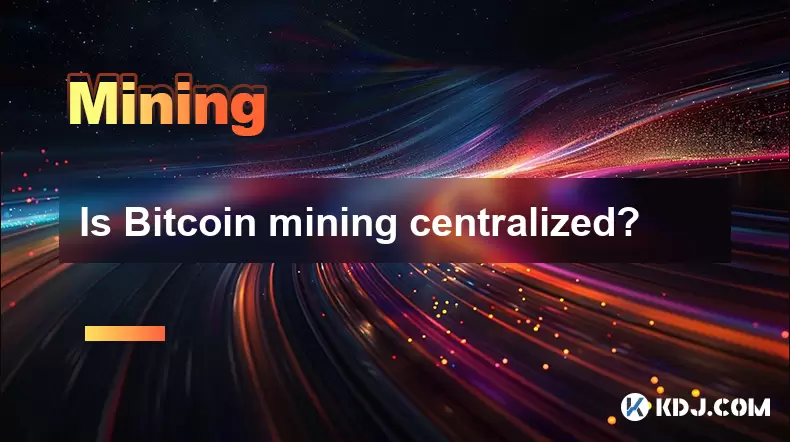
What Is Bitcoin Mining?
Bitcoin mining refers to the process by which new bitcoins are introduced into circulation and transactions are verified on the blockchain. Miners use powerful computing hardware to solve complex cryptographic puzzles, a process that secures the network and validates blocks of transactions. The decentralized nature of Bitcoin was designed to prevent any single entity from controlling the network, but concerns about centralization have grown as mining has evolved.
Factors Contributing to Centralization
Several factors have contributed to the increasing centralization of Bitcoin mining. One major factor is the high cost of mining equipment, such as ASICs (Application-Specific Integrated Circuits), which are specifically designed for cryptocurrency mining. ASICs are expensive and often only accessible in bulk to large-scale operations, giving an advantage to well-funded mining farms.
Another contributing factor is the need for cheap electricity. Mining consumes significant amounts of energy, so miners tend to cluster in regions where electricity is inexpensive. Certain countries, like China before regulatory crackdowns, became hotspots due to their low energy costs, leading to geographic centralization.
Additionally, the rise of mining pools has added another layer of centralization. Mining pools allow individual miners to combine their computational power to increase their chances of earning block rewards. While this benefits small miners, it also means that a few large pools control a significant portion of the network’s hash rate.
The Role of Mining Pools
Mining pools play a crucial role in how Bitcoin mining operates today. These pools distribute the workload among participants and share the rewards proportionally based on each miner’s contribution. However, some pools have grown to dominate the mining landscape. If a single pool or a small group of pools controls more than 50% of the total hash rate, it could theoretically launch a 51% attack, compromising the integrity of the blockchain.
Despite these risks, most mining pools operate transparently and follow community norms to avoid undermining trust. Still, the concentration of hash rate in a few entities raises concerns about the long-term decentralization of Bitcoin.
Geographic Concentration of Mining Operations
Bitcoin mining has historically been concentrated in certain geographic regions. Before China's regulatory actions in 2021, it was estimated that over 65% of global Bitcoin mining took place there. This level of geographic centralization posed systemic risks, as government policies or blackouts could disrupt a significant portion of the network.
Following the exodus from China, mining activity dispersed to other countries such as the United States, Kazakhstan, and Russia. While this diversification improved resilience, certain jurisdictions still host disproportionately large shares of mining operations due to favorable regulations and energy prices.
Moreover, political instability or shifts in policy can quickly affect the distribution of mining power. Miners are highly mobile and may relocate rapidly in response to economic incentives or legal pressures, making the geographic distribution dynamic but not necessarily decentralized.
Economic Barriers to Entry
Economic barriers further contribute to the centralization of Bitcoin mining. Setting up a mining operation requires not only capital investment in hardware but also infrastructure for cooling, data centers, and continuous maintenance. Small-scale miners often struggle to compete with institutional players who can negotiate better electricity rates and hardware discounts.
The volatility of Bitcoin's price also impacts smaller miners disproportionately. During bear markets, when profitability declines, many individual miners shut down operations, while large-scale farms can continue running due to economies of scale.
Furthermore, access to financing and technical expertise remains uneven across regions. Only those with sufficient resources and knowledge can sustainably participate in mining at scale, reinforcing existing centralization trends.
Technical Aspects of Decentralization
From a protocol standpoint, Bitcoin remains decentralized because no single node or miner can alter the rules of the system without consensus. Each block must adhere to the network’s consensus rules, and invalid blocks are rejected by the peer-to-peer network regardless of the miner’s size.
However, the practical reality shows that a handful of entities wield considerable influence over transaction confirmation and block production. This does not mean the system is controlled, but it does indicate that operational centralization exists alongside protocol-level decentralization.
Efforts to improve decentralization include innovations like Stratum V2, which enhances mining pool protocols to give individual miners more control and reduce pool operator dominance. Such developments aim to restore some aspects of decentralization that were eroded over time.
Frequently Asked Questions
Can Bitcoin mining become fully decentralized again?
Barring major technological advancements or regulatory interventions, full decentralization is unlikely due to economic and logistical constraints. However, tools like Stratum V2 and decentralized mining pools are being developed to promote greater distribution.
Do governments regulate Bitcoin mining?
Yes, governments have varying approaches to regulating Bitcoin mining. Some countries ban or restrict it due to environmental or financial stability concerns, while others incentivize it through tax breaks or low-cost energy.
How does mining centralization affect Bitcoin’s security?
If a single entity or colluding group controls over 50% of the hash rate, they could potentially reverse transactions or prevent confirmations. However, such an attack would likely be costly and damage confidence in Bitcoin itself.
Are there alternatives to traditional Bitcoin mining?
Some alternative cryptocurrencies use proof-of-stake mechanisms to eliminate mining altogether. For Bitcoin, Layer 2 solutions like the Lightning Network aim to reduce reliance on frequent on-chain transactions, indirectly affecting mining dynamics. Disclaimer:info@kdj.com
The information provided is not trading advice. kdj.com does not assume any responsibility for any investments made based on the information provided in this article. Cryptocurrencies are highly volatile and it is highly recommended that you invest with caution after thorough research!
If you believe that the content used on this website infringes your copyright, please contact us immediately (info@kdj.com) and we will delete it promptly.
- Little Pepe, Pepe Coin, and Bonk: Meme Coin Mania Sweeping Crypto in 2025!
- 2025-07-13 22:36:38
- ADA, NEAR, BlockDAG: Crypto Trends and Insights You Can't Miss (NYC Style)
- 2025-07-13 22:36:38
- TRUMP Tokens Unlocked: A Deep Dive into World Liberty Financial and Aqua 1's $100M Investment
- 2025-07-13 22:50:37
- Cryptos Under $0.10: Solana's Successors and the Top 10 Potential
- 2025-07-13 22:50:37
- Crypto, Gold, and Bitcoin: A New York Minute on the Digital Gold Rush
- 2025-07-13 20:30:16
- Crypto iGaming in India: JetTon, LunarBet, and the Evolving Landscape
- 2025-07-13 20:50:16
Related knowledge
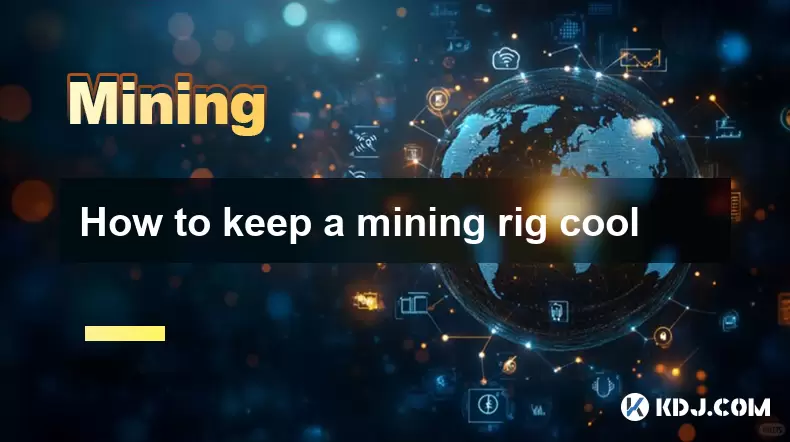
How to keep a mining rig cool
Jul 12,2025 at 01:42pm
Understanding the Importance of Cooling in Mining RigsCryptocurrency mining is an intensive process that places heavy demand on hardware components, p...

How much does it cost to start crypto mining?
Jul 13,2025 at 12:22am
Understanding the Basic Costs of Crypto MiningStarting crypto mining involves several upfront and ongoing expenses. The primary costs include hardware...
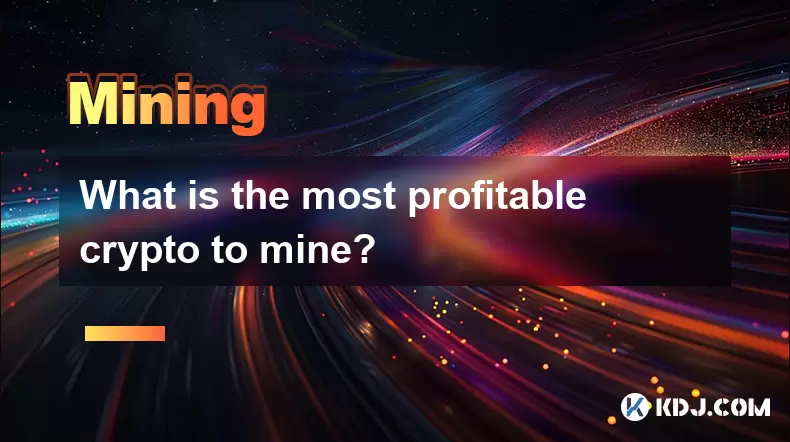
What is the most profitable crypto to mine?
Jul 13,2025 at 07:00am
Understanding Mining Profitability in CryptocurrencyWhen evaluating the most profitable crypto to mine, it's essential to consider several factors tha...
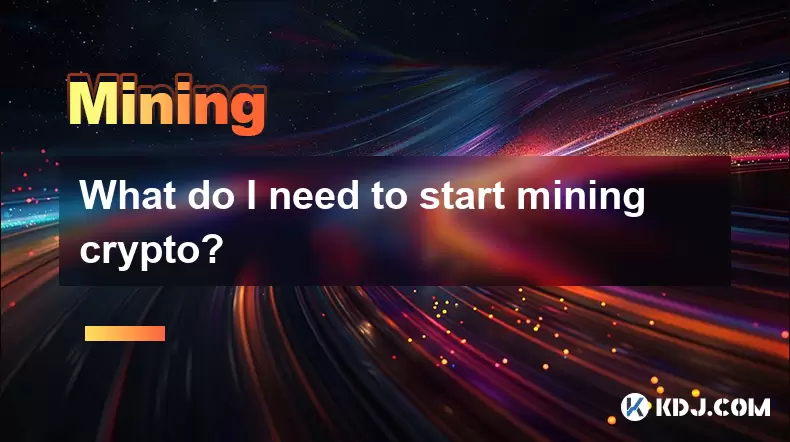
What do I need to start mining crypto?
Jul 13,2025 at 12:28am
Understanding the Basics of Crypto MiningCrypto mining is the process by which transactions are verified and added to a blockchain, and new coins are ...
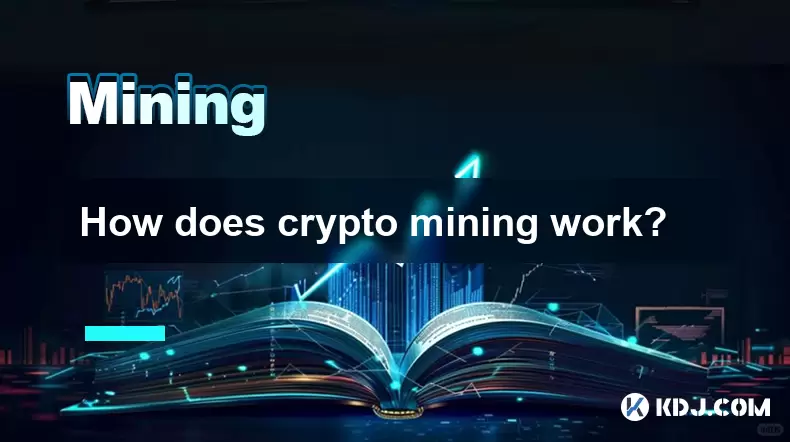
How does crypto mining work?
Jul 13,2025 at 11:01am
Understanding the Basics of Crypto MiningCrypto mining is the process through which new cryptocurrency coins are introduced into circulation and trans...

How to find the best Dogecoin mining pool for me
Jul 12,2025 at 04:14pm
Understanding the Role of a Mining PoolWhen mining Dogecoin, joining a mining pool can significantly increase your chances of earning consistent rewar...

How to keep a mining rig cool
Jul 12,2025 at 01:42pm
Understanding the Importance of Cooling in Mining RigsCryptocurrency mining is an intensive process that places heavy demand on hardware components, p...

How much does it cost to start crypto mining?
Jul 13,2025 at 12:22am
Understanding the Basic Costs of Crypto MiningStarting crypto mining involves several upfront and ongoing expenses. The primary costs include hardware...

What is the most profitable crypto to mine?
Jul 13,2025 at 07:00am
Understanding Mining Profitability in CryptocurrencyWhen evaluating the most profitable crypto to mine, it's essential to consider several factors tha...

What do I need to start mining crypto?
Jul 13,2025 at 12:28am
Understanding the Basics of Crypto MiningCrypto mining is the process by which transactions are verified and added to a blockchain, and new coins are ...

How does crypto mining work?
Jul 13,2025 at 11:01am
Understanding the Basics of Crypto MiningCrypto mining is the process through which new cryptocurrency coins are introduced into circulation and trans...

How to find the best Dogecoin mining pool for me
Jul 12,2025 at 04:14pm
Understanding the Role of a Mining PoolWhen mining Dogecoin, joining a mining pool can significantly increase your chances of earning consistent rewar...
See all articles

























































































